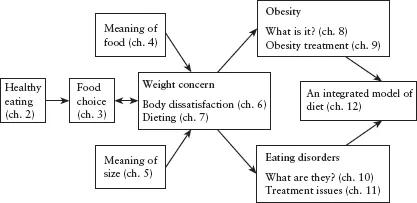
- English
- ePUB (mobile friendly)
- Available on iOS & Android
eBook - ePub
About this book
With its primary focus on the psychology of eating from a social, health, and clinical perspective, the second edition of The Psychology of Eating: From Healthy to Disordered Behavior presents an overview of the latest research into a wide range of eating-related behaviors
- Features the most up-to-date research relating to eating behavior
- Integrates psychological knowledge with several other disciplines
- Written in a lively, accessible style
- Supplemented with illustrations and maps to make literature more approachable
Frequently asked questions
Yes, you can cancel anytime from the Subscription tab in your account settings on the Perlego website. Your subscription will stay active until the end of your current billing period. Learn how to cancel your subscription.
No, books cannot be downloaded as external files, such as PDFs, for use outside of Perlego. However, you can download books within the Perlego app for offline reading on mobile or tablet. Learn more here.
Perlego offers two plans: Essential and Complete
- Essential is ideal for learners and professionals who enjoy exploring a wide range of subjects. Access the Essential Library with 800,000+ trusted titles and best-sellers across business, personal growth, and the humanities. Includes unlimited reading time and Standard Read Aloud voice.
- Complete: Perfect for advanced learners and researchers needing full, unrestricted access. Unlock 1.4M+ books across hundreds of subjects, including academic and specialized titles. The Complete Plan also includes advanced features like Premium Read Aloud and Research Assistant.
We are an online textbook subscription service, where you can get access to an entire online library for less than the price of a single book per month. With over 1 million books across 1000+ topics, we’ve got you covered! Learn more here.
Look out for the read-aloud symbol on your next book to see if you can listen to it. The read-aloud tool reads text aloud for you, highlighting the text as it is being read. You can pause it, speed it up and slow it down. Learn more here.
Yes! You can use the Perlego app on both iOS or Android devices to read anytime, anywhere — even offline. Perfect for commutes or when you’re on the go.
Please note we cannot support devices running on iOS 13 and Android 7 or earlier. Learn more about using the app.
Please note we cannot support devices running on iOS 13 and Android 7 or earlier. Learn more about using the app.
Yes, you can access The Psychology of Eating by Jane Ogden in PDF and/or ePUB format, as well as other popular books in Psychology & Physiological Psychology. We have over one million books available in our catalogue for you to explore.
Information
1
Introduction
Obesity and overweight are on the increase, eating disorders are becoming more common, and many people diet to lose weight. In parallel, diet-related subjects are in vogue and over the past few years there has been an explosion of interest in any aspect of diet, from healthy eating through to eating disorders. The popular press offers features on diet, bookstores sell books on healthy eating, and television producers broadcast documentaries on people who are overweight, are underweight, have a solution to weight, or need a solution to their weight. The academic and research literature has also proliferated. Diet provides the focus for dieticians, nutritionists, endocrinologists, geneticists, psychiatrists, sociologists, and a range of psychologists from social, biological, health, and clinical psychology perspectives. There are journals dedicated to the subject of diet, specialist books produced, and conferences held to provide a forum for discussion. This book aims to provide a detailed map of this expanding area.
This chapter covers the following:
- The aim of this book
- The focus of this book
- The structure of this book
- Further reading
The Aim of This Book
The literature on diet is vast and is contributed to by individuals with a range of different interests. Some are interested in healthy eating, others are concerned with eating-related problems, and most produce work which is focused on their one area. Work is specialized to enable detailed research and theoretical development. As a result the relationships between different aspects of diet-related work become unclear. For example, healthy eating provides a context for understanding obesity, but these two literatures are often kept separate. Food choice offers a context for understanding eating disorders, but the paths of these areas rarely cross. Dieting and body dissatisfaction are relevant to understanding eating disorders, obesity, and food choice but are only sometimes studied by the same people and written about in the same papers and same books.
This book aims to provide a detailed map of the diet literature and to cover the spectrum of eating behavior, from healthy eating through body dissatisfaction and dieting to obesity and eating disorders. In doing so, it aims to show how these different areas are related to each other and to draw out some common themes which run through this immense body of work.
The Focus of This Book
Diet is studied from a range of different disciplinary and theoretical perspectives, and a comprehensive understanding of diet cannot be achieved without these different literatures. This book therefore includes literature from a range of approaches such as nutrition, physiology, psychiatry, and sociology. But the primary focus of the book is psychology. In particular, this book draws on mainstream psychology in the form of developmental, cognitive, clinical, social, and health psychology. It integrates this approach with that from the psychotherapeutic literature which is often based on clinical experience and informed by feminist or psychoanalytic perspectives. This book therefore offers “the psychology of eating” in the broadest sense and illustrates how a wealth of perspectives have been used to analyze this complex area of work.
The Structure of This Book
The structure of the book is illustrated in figure 1.1. Chapter 2 focuses on healthy eating and describes what is currently considered to be a healthy diet, how diet influences health as a cause of both morbidity and mortality, and how diet is used as a treatment once a diagnosis has been made. It then explores who has a healthy diet and describes large-scale surveys which have assessed children’s diets, the diets of young adults, and the diets of the elderly. This chapter draws on both the medical and nutrition literatures.

Figure 1.1 From healthy to disordered eating: A spectrum of diet.
Next, chapter 3 explores the research on food choice. This chapter focuses on three main theoretical approaches from psychology, and assesses the contribution of developmental theories, with their emphasis on exposure, social learning, and associative learning, and cognitive theories, with their focus on social cognition models. It also describes psychophysiological approaches in terms of the role of metabolism, the role of the hypothalamus, the impact of neurochemicals on hunger and satiety, and the role of stress in determining either under- or overeating. It is argued that, although useful as a means to explain healthy eating, these approaches to food choice only implicitly include the complex meanings associated with both food and body size.
In line with this, chapters 4 and 5 address the meanings of food and the meanings of size, respectively. Chapter 4 draws on the sociological and anthropological literatures which have examined the meaning of food and integrates these with writings of psychotherapists. Chapter 5 examines the meaning of size in terms of the impact of the media and the associations with thinness and obesity, and examines both the social psychology and feminist approaches. As a result of these meanings, food choice is complex, and many individuals develop weight concerns.
One form of weight concern is body dissatisfaction; chapter 6 examines what body dissatisfaction is, how it is measured, and what causes it. Body dissatisfaction often leads to dieting, which is the focus of chapter 7. This chapter describes why body dissatisfaction leads to dieting. It explores the consequences of attempted food restriction and specifically examines the relationship between dieting and overeating and the role of boundaries, mood, cognitions, self-awareness, and denial. These two chapters on weight concern mainly focus on psychological research, wi...
Table of contents
- Cover
- Table of Contents
- Title
- Copyright
- List of Figures
- Foreword
- Acknowledgments
- 1: Introduction
- 2: Healthy Eating
- 3: Food Choice
- 4: The Meaning of Food
- 5: The Meaning of Size
- 6: Body Dissatisfaction
- 7: Dieting
- 8: Obesity
- 9: Obesity Treatment
- 10: Eating Disorders
- 11: Treating Eating Disorders
- 12: An Integrated Model of Diet
- References
- Author Index
- Subject Index
- End User License Agreement